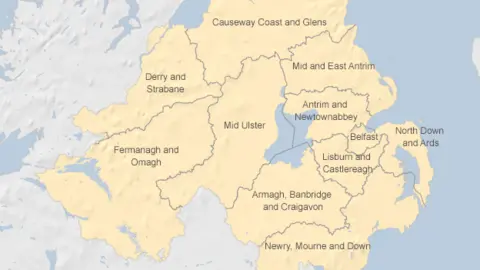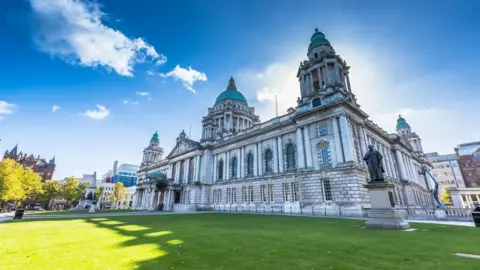NI councils: Planned savings 'won't mean service cuts'
 PA Media
PA MediaSix councils in Northern Ireland have insisted that millions of pounds in planned savings will not lead to cuts in public services.
A number of councils have nearly £11m in planned savings and efficiency measures for the 2021-22 period, an investigation by the BBC's shared data unit has found.
The proposals reflect pressures facing councils as a result of the pandemic.
Mid Ulster District Council is to make the largest saving of £4.5m.
This figure amounts to almost 10% of the authority's overall annual budget.
The council voted to freeze domestic rates earlier this year, choosing instead to absorb the loss with £690,000 from its reserves.
Councils in Northern Ireland are to use more than £3.5m worth of reserves this financial year.
A spokesperson for Mid Ulster District Council said other "income pressures" of £1.4m resulting from the Covid-19 pandemic would be fully compensated by central government.
A further £700,000 is to be saved through a pay freeze for public sector workers earning more than £24,000 a year.

The spokesperson said savings from its IT department, waste management and non-essential overtime would help to offset financial pressures, alongside £300,000 in "miscellaneous" savings.
Mid Ulster Democratic Unionist Party (DUP) councillor Kyle Black said that while he was unfamiliar with the figure of £4.5m the council has predicted it will save, officers had "worked tirelessly over what has been an extremely difficult year to manage the council finances efficiently".
Economic uncertainty
Antrim and Newtownabbey Borough Council is to make savings of almost £2.5m over the coming year.
The council has historically set the lowest rates increases in Northern Ireland, with this year's rates frozen at last year's level.
A spokesperson said the money saved would come from the council's voluntary severance scheme.
So far, 40 staff members have taken voluntary redundancy without the need for compulsory measures.
The spokesperson said Antrim and Newtownabbey Borough Council's financial situation had been eased by the furlough scheme and financial assistance from central government following "a period of concerted lobbying".
"These changes have not resulted in any change to the quantity or quality of council services," the spokesperson added.
SDLP councillor Ryan Wilson said it was hard to tell whether or not services in the area would be affected due to economic uncertainty and the Covid-19 pandemic.
Mr Wilson said he understood there were an additional 60 staff vacancies not being filled on top of the existing redundancies.
"If things were normal, undoubtedly residents would feel the impact of a 20% reduction in the overall staffing structure," he told BBC News NI.

Belfast City Council is planning savings of more than £1.25m and is the only local authority in Northern Ireland predicting a budget shortfall by 2023-24, estimated at £800,000.
A spokesperson for Northern Ireland's biggest local authority said money saved so far had included "a small number of voluntary redundancies, as well as savings made across various budget headings".
"These savings were made without impacting on the quality of services or the delivery of priorities," the spokesperson added.
Ards and North Down Borough Council said it was planning to save £640,000 through "management of vacancies" and by the "control and reform of some discretionary budgets".
A spokesperson said the council had been able to set a budget for the financial year "without adversely impacting services or staffing budgets".
Derry City and Strabane District Council, which in 2020 boasted the lowest rates increase by the council for 50 years, is to save more than £600,000 this year.
Causeway Coast and Glens Borough Council members voted for the largest rise in rates in Northern Ireland for 2021-22 and subsequently plans to make savings of nearly £1.5m.
Both authorities claim these savings will have no affect on local services or staffing.
The Northern Ireland Local Government Association (NILGA) told BBC News NI it was working with all 11 councils to help deliver "effective and efficient" services, including the use of money-saving shared services such as waste management and environmental health.
A NILGA spokesperson said council savings initiatives should be "all about improved front line services delivered locally, at affordable costs".
"Ultimately all public sector budgets should be driven by local need," the organisation added.
